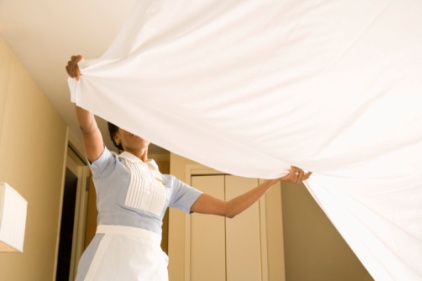 High ergonomic injury rates among the workers who clean the guest rooms at Hyatt Hotels are at the center of a global boycott of the chain – a boycott that picked up a new coalition member last month.
High ergonomic injury rates among the workers who clean the guest rooms at Hyatt Hotels are at the center of a global boycott of the chain – a boycott that picked up a new coalition member last month.
The 60,000-member Association of Flight Attendants (AFA) voted unanimously to support Hyatt workers after its Executive Board heard testimony from Baltimore Hyatt Regency Hyatt employees such as Charlotte Knox, a housekeeper with 34 years of service, who said that subcontracting at her hotel has reduced the housekeeping staff by more than 75% since she started working at the hotel. Knox also spoke about her difficulty paying medical bills for her recent hip replacement surgery under Hyatt’s medical plan and low wages.
Individuals and groups who sign on to the boycott pledge not to eat, meet or sleep at Hyatt until conditions for workers improve.
The boycott was launched by Unite Here -- an organization representing hotel, airport, gaming, food service and textile workers in the U.S. and Canada. Now in its third year, it has attracted support from unions, academia and human rights organizations such as the AFL-CIO and the NFL Players Association.
Subcontracting linked to dangerous working conditions
Writing in the National Catholic Reporter, Father Clete Kiley said that Hyatt has “a shameful record” of exploiting the low-wage, predominantly female, predominantly immigrant workers. “The company frequently uses subcontracting to pay lower wages and evade liability for dangerous working conditions,” said Kiley. “Hyatt's housekeepers had the highest rate of injuries out of the chains included in a study of 50 hotels in the American Journal of Industrial Medicine.”
Kiley noted that workers at some Hyatt hotels clean as many as 30 rooms a day -- almost double what is typically required at union hotels. “Hyatt threatened to fire a woman who would not return to work three days after a C-section, and has fired other women after they spoke out about abusive treatment.”
After a year-long investigation of Hyatt properties nationwide, OSHA took the unprecedented step of issuing a formal Hazard Alert Letter to Hyatt Hotels, notifying the company of ergonomic risk factors faced by housekeepers in the course of their daily work and recommending steps for the company to take to reduce the ergonomic strain of housekeeping labor.
Since that time, OSHA and its state counterparts have issued 18 citations against Hyatt and 3 citations against one of its subcontractors, proposing combined fines of over $118,000 for alleged violations of various safety regulations protecting housekeepers and other hotel workers. Hyatt has appealed and in some cases settled the citations against it. In addition, State OSHA plans in California and Hawaii have issued similar ergonomic hazard notices to Hyatt properties in those states.
Hyatt fires back
Hyatt calls the boycott “a publicity stunt,” aimed at boosting union membership at non-union Hyatt hotels. The company points to a 2012 Gallup Great Workplace Award based on independent surveys of its workers, including housekeepers. Additionally, Hyatt Hotels have made Best Places to Work lists in Baltimore, Chicago, Denver and San Francisco.
“We know happy associates who love what they do and where they work provide the most welcoming experience for our guests,” said Doug Patrick, senior vice president – human resources, Hyatt. “At the heart of Hyatt’s culture is a deep respect for our associates who deliver our brands to guests each and every day.”
The company claims it maintains an “outstanding" workplace safety record, and says the average tenure of Hyatt housekeepers in the U.S. is more than 12 years.
Mops, sheets and ergonomic training
Unions are demanding that Hyatt make housekeeping work safer by provide workers with training to help them reduce the risk of ergonomic injuries. They are also calling for the use of long-handled mops – (instead of the rags currently in use at many Hyatt facilities)and fitted bedsheets, which would reduce back strain for those changing multiple beds per day.
Hyatt opposed a California bill that would have required hotels to use fitted sheets in order to reduce injuries among cleaning staff.
Workers go global, too
As reported on ISHN Global, A recent International Labor Organization (ILO) study found that working conditions in the hotel industry vary widely from one country to another. “However, it is clear that migrant workers are particularly vulnerable in terms of health and safety. They are also more likely, women especially, to remain in low-skill and lower-paid positions.” (Click here to read the entire ISHN Global story.)
While globalization increases the power of multinational corporations, it is having a corresponding effect among the global workerforce – at least in this instance. As the HyattHurts movement spread, workers in Hyatts in India, the UK, Israel and the Phillipines went on strike in solidarity with their U.S. and Canadian counterparts.
Additionally, the AFA is working to elicit support from flight attendants around the world. AFA International President Veda Shook recently discussed the issue in London at the International Transport Workers’ Federation Civil Aviation Meeting.




